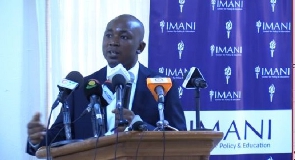Finance Lecturer at the University of Ghana Business School and a Fellow of IMANI Africa, Prof. Godfred Bokpin has indicated that government’s special initiatives are increasing the debts of the country.
Speaking at IMANI’s lecture on the theme “Is Ghana’s debt sustainability under serious threat after the IMF program?”, Prof. Bokpin stated that the Free SHS policy, Special Prosecutor’s Office, One-District One-Factory, Nation Builders’ Corps, Planting for Food and Jobs and other initiatives enrolled by the current government is adding rising expenditure rigidities thereby costing the country.
According to him, although the initiatives are good and will help the country in the long term, they are currently adding more debts since they are not generating revenue.
“Whilst expenditure has been rising without a corresponding increase in the revenue envelope, we are stretching that envelope further with other initiatives that are also adding to cost. It is possible that the benefit from these initiatives may not come immediately but they’re also stretching the revenue envelope”, he stated.
Prof. Bokpin further questioned the sustainability of the initiatives stressing that “The idea is that in the medium to the long term, we expect that we’ll be able to realise some gains from these initiatives. How sustainable it will be, I believe we have to be able to look at it objectively then access the sustainability of these initiatives over the years”.
Though IMF has projected Ghana’s GDP growth to be the fastest in the world in 2019 growing at 8.8 percent, Ghana is among 11 countries in Africa that are at high risk of debt distress.
The country’s debt is hovering around 60 percent of GDP and in his presentation, Prof. Bokpin revealed that the debt servicing is absorbing more than 45 percent of tax revenues and this is partly because the country is not collecting sufficient tax revenues.
According to him, Ghana is losing excessively through tax exemptions and it’s not benefiting the public purse.
He therefore urged government to reconsider as the high volumes of exemptions alone could reduce the country’s borrowing and its subsequent debt servicing.

















